
Why ADR Works In Healthcare, Reason #2
October 27, 2007
Continuing the thread started in my last post, there are several reasons why ADR works especially well in the healthcare industry.
[Image: Photo of Coins in the Trevi Fountain in Rome being collected at early morning, by Giovanni Dall\’Orto, March 2005]
Reason #2.
The parties to a healthcare dispute often (although not always) have interests at stake other than money, or which cannot easily be reduced to a specific dollar demand. Traditional courtroom litigation is designed primarily to determine which party to a dispute must pay the other party, and how much. Although courts can grant “equitable relief”, essentially ordering one party to do or stop doing something, that option is limited in scope and driven by the form of the prevailing party’s plea for relief. In contrast, ADR processes embrace the notion that flexible solutions, tailored to the parties’ unique interests, offer the best outcome to any dispute.
An example of this advantage of ADR would be a dispute between a hospital and a medical group over the interpretation of the group’s contract to provide certain medical services at the hospital. The dispute could involve any number of issues important to both parties, but could easily place the parties in a situation where the contract seemingly must be terminated, and one side will then sue the other for breach of contract. Neither party in such case really wants to sue the other for money damages, nor do they want the disruption to patient care and hospital services that would accompany protracted litigation. Courtroom litigation in such case will ultimately assure that the parties’ legal rights are determined and enforced, but it will also create the negative collateral effects that come from using too dull and heavy a tool. The use of ADR processes in such a case would provide the parties with options and alternatives from which to jointly reach a workable solution.
Other examples of this advantage of ADR would be disputes over the medical staff privileges to be granted by a hospital to a physician or other practitioner; conflicts between a hospital and its medical staff concerning the interpretation or amendment of the medical staff’s bylaws; disputes within the board of trustees of a health system concerning the system’s mission, or the performance of management; and disputes among providers concerning quality of care or patient access issues. Although financial considerations may be important in all these disputes, in none of them does either party seek a payment of money. ADR processes, as determined by the parties, could be focused immediately upon what the parties in such cases really care about.
